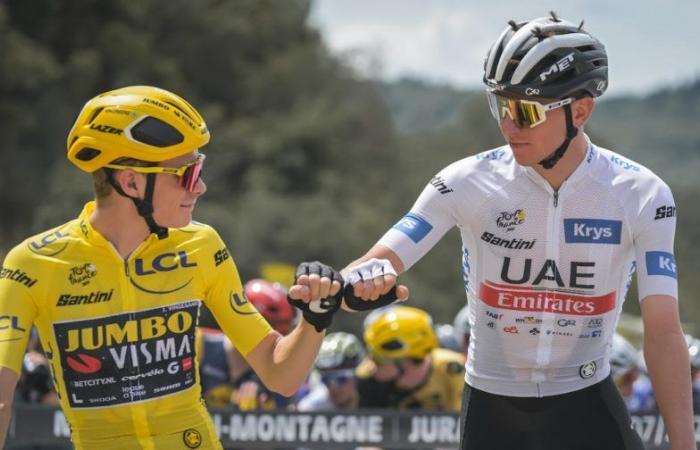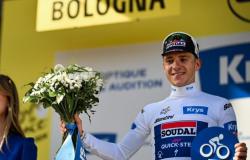Without any chauvinism, is it possible to declare the Tour de France as the greatest cycling event in the world and therefore as the greatest of the “grand tours”?
There are three major men’s cycling tours, stage races that take place over three weeks. In May, the Giro d’Italia, with its pink jersey, is held. The 107e edition held this year was won hands down by the Slovenian Tadej Pogacar. In July, the leader of the Tour de France wears the yellow jersey. It’s 111e edition this year which is taking place this year. At the end of August, it is the “Vuelta” which sets off with its red jersey, 79e edition in 2024.
Economic data is scarce, but largely puts the Great Loop in the lead. Revenues from the Tour de France are estimated at around 170 million euros, 70 million for the Giro and we can assume, taking into account other variables, that they are a little less for the Vuelta. Another order of magnitude available: the bonuses granted to participants in these tours. They are 2.3 million euros for the Tour, including 500,000 euros for the final winner, 1.6 million for the Giro (265,000 euros for the first) and 1.1 million for the Vuelta (150,000 euros for the one who brings the red jersey to Madrid).
In terms of audiences, the Tour is expected to have more than 3.5 billion viewers, far ahead of the Giro (around 775 million) and the Vuelta (360 million). Another indication of the superiority of the French event: Netflix is producing a series on the Tour but not on the other two.
But what about on a purely sporting level? In recent years, the best French climbers like Thibault Pinot or Romain Bardet have sometimes preferred to focus their season on the general classification of the Giro d’Italia, which often has a more difficult mountain course. Nevertheless, it is on the French roads that the cream of the peloton continues to meet.
The Tour always attracts
A grand tour currently consists of 176 riders, divided into 22 teams of 8. Thanks to sites specializing in cycling data such as ProCyclingStats or the ranking established by the International Cycling Union, it is possible to assign a score to each rider based on their performances, weighting them by the importance of each race. We have thus compiled the value of the numbers entered in the grand tours for 10 years using the scores from previous seasons.
Last year, all the teams that took part in the three major tours fielded their best squad for the Tour de France, with the notable exception of Soudal Quick-Step, which had ambitions for the Giro and the Vuelta for its leader, world champion Remco Evenepoel (and to a lesser extent Team DSM-Firemich).
The same observation applies to other years. It appears that the Tour always weighs between 40 and 50% of the total of the three major tours. Another way of expressing it, it has on average, a starting grid 1.76 times more “qualitative” than the Giro d’Italia and 1.65 times higher than the Giro d’Espanya.
If we only retain the 50 best riders from previous years, this ratio increases further: 2.90 compared to the Tour of Italy and 2.20 regarding the Tour of Spain.
To choose is to renounce
These results and these differences are the result of a particularity of cycling races: it is complicated for a rider to participate in several tours in the same year. A tennis player, barring injury, will participate in all four grand slam events. His participation at Roland-Garros, barring injury, will not compromise his result at Wimbledon. The same is not true in cycling: only 10 riders in history have managed to win the general classification of two grand tours in the same calendar year. The latest: Christopher Froome in 2017 for a Tour de France–Vuelta double, Alberto Contador in 2008 for a Giro-Vuelta double and Marco Pantani in 1998 for a Giro–Tour de France double. Waiting for Tadej Pogacar this year?
Last year, American Sepp Kuss became the first rider since Gastone Nencini in 1957 to win a grand tour (the Vuelta) having participated in all three in the same season. Over the last 10 years, 11% of riders who participated in the Tour de France participated, in the same year, in the Tour of Italy and 18% in the Tour of Spain. 26% of riders competed, in the same year, in the Tour of Italy and the Tour of Spain, which are spaced further apart in time.
Billy Ceusters/ASO
Choices must be made for each team and each rider in the way the season is organised. French double world champion Julian Alaphilippe is thus giving up the Tour de France this year, after winning a stage of the Giro, in order to save himself for the road race at the Paris Olympics. The 18 top division teams are required to take part in all UCI World Tour events but can also start races in lower divisions. A team at the highest level of cycling must have at least 23 riders in its squad. Especially since the calendar of events can sometimes overlap, as is the case in March for Paris-Nice and Tirenno-Adriatico.
The choices are made according to the preparation program for the targeted events, according to the characteristics of each runner and injuries. Some races prepare better than others because they are consistent in terms of route, dates and geographical locations. They are linked to training camps, planned at different times of the year so that the runners reach their peak form in relation to the targeted deadlines, and the necessary rest periods.
The few calculations presented thus allow us to consider that the Tour de France is the priority event for cycling teams. The predominance of the Tour is such that teams that have little chance there do not seek to line up a team of inferior quality to maximize their workforce on another major tour. The importance of winning a stage, a distinctive jersey, of figuring well in the general classification, of being able to be present in the media whirlwind that accompanies the Tour is such that the stakes of the Tour de France far exceed the events that come into competition.






